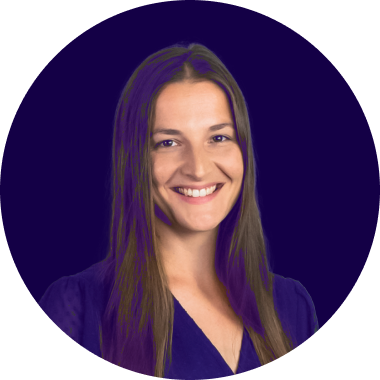The data industry needs you! More than 120 women applied to this call for the "Women in Data" scholarship. 50 of them received one of the coveted scholarship spots for the Data Analyst advanced training at StackFuel. And unfortunately, it's true: the data industry is still predominantly male. Just one-sixth of data experts are female, with a negative impact on business, development and research. The Corona Crisis has been particularly detrimental to women's career advancement. This is exactly where the StackFuel and Telefónica scholarship should have a positive impact and qualify women for data professions and make them fit for the future with data skills.
Andreea is one of 50 winners. She has always seen herself as more of an all-rounder. She hopes the Data Analyst training will open new doors in her career and help her overcome her own fears. In the following interview, she explains why she first had to learn to trust her own feelings, find her own voice and consider a career change as an option.
Congratulations on receiving the "Women in Data" scholarship! What can you tell our readers about yourself and your career path so far?
Thank you very much! My name is Andreea Buteata. I was born and raised in Romania and have been living in Germany for 10 years. I currently work as an Inside Sales Representative at Ansys, a simulation software company. My daily work is generating and qualifying inbound sales leads in the sales department.
I would say of myself that I was always a bit indecisive when it came to my career. I always had the feeling that I could do everything and nothing at the same time. Maybe that's because of my educational background. I got my bachelor's degree in a mix of sociology, psychology, political science and media. So I've always struggled to choose just one thing. My professional background, on the other hand, is more traditionally in sales, and I've also gained a bit of management experience on the side.
What changes have 2020 and 2021 brought to your life and career?
Probably the same changes they brought for everyone. In 2020, I had just changed employers. So I had only spent about a month in my new office before we all had to be sent home on lockdown. That in itself brought a lot of challenges. The biggest one was the fact that I was working from my living room table and have been ever since. I had to set my own daily goals and work more independently than ever before. I miss the small conversations with colleagues during coffee breaks, the human interactions in the office, and just getting to know other people you work with, even if you're not working on the same project.
Have you encountered any other hurdles you've had to overcome during your career?
Unfortunately, a really big hurdle was sexism in the workplace. I'm lucky that I don't have this problem at my current workplace, but in the past I unfortunately had to go through this experience. Maybe I've changed in that I'm now able to really trust my feelings and say when something is bothering me. Learning to do that helped me, but it was a difficult process for me. I have since realized that my feelings were not just an overreaction and I have really started to trust my own judgment. This is still a very emotional issue for me, and I wish I had the perfect magical solution that could help anyone and everyone facing these situations.
Where does your interest in working with data come from?
I wish I could say that I have always been interested in data, but that would not be true. What first piqued my interest was my previous job. Our global marketing manager was visiting for a few days and we got to talking. Suddenly he was showing me all the cool things you can do with data. So we were looking at forecasting and looking at what that data can tell us and how to get into the details and how to actually make business decisions based on that data. That was fascinating! After he left, I tried to do it on my own. And now I'm really happy that the scholarship is allowing me to go deeper into this.
Speaking of the scholarship: How did you find out about the scholarship and what made you decide to apply?
A friend sent me the ad. She knew I was interested in data analytics, and I thought, "Why don't you try it? Let's do it. I have nothing to lose." A little voice inside me said I wasn't going to get the scholarship anyway. But I thought the scholarship would be a great opportunity for me, and I'm really looking forward to taking a real Data Analyst course now that I've won. When you read that and you see that this scholarship is for Women in Data, women in the data industry, you feel so cool, like you're going to get a chance to be a part of that as well.
If I hadn't gotten the scholarship, I would have even tried to save up for the Data Analyst course and just do it the year after. So I still feel privileged that I was able to apply for this scholarship and now get to do the course. I think it's harder for other people to make that lateral entry. That's why it's so important that there are opportunities like the Women in Data scholarship." At the launch event, there were so many women with completely different backgrounds and stories: young women, older women, some of them had children. That was really great to see!
I'm excited to meet other women in this course who are just as passionate about data and enjoy working with data as I am. I don't know yet if my career path will ultimately really lead me into the data analytics field or if I'll really enjoy it at the end of the day, but that's just something to find out. So I'm on a journey of discovery and if I enjoy it, I hope that some doors will open for me professionally.
Despite your enthusiasm, do you have any fears about working with data, programming and mathematics?
Yes, of course I have a little fear, - even if it's silly, but it's there. But taking the Data Analyst course is a step towards overcoming my fear, because doing something you're afraid of is often also a great opportunity. So taking this course is part of a larger process for me.
I grew up with the idea that one person was good at languages and the other person was good at math. In high school, I focused more on math and computer science, but I still never cared much about it. Now I think it's a great opportunity to explore the subject more, and the fact that I chose it myself helps me overcome my anxiety. So it's totally okay to be afraid of something, but you should put your fear behind you and do it anyway.
What do you think keeps other women from following the same path as you?
I believe that we are all individuals and therefore the challenges we face are different. What I have found challenging is that I had internalized the mindset that once you have chosen a career, you should stick with it and not change. At the same time, I have always admired people who have made a successful career change. For me, that was not a matter of course, because it also means you have to start from scratch. But I'm convinced that anyone can do it. What helped me was to ask myself what I really enjoy and get excited about in a job and then to follow that feeling. I haven't yet completed this process completely successfully myself, but it motivates me to now look in areas I wouldn't have dared otherwise.
What steps do you think we still need to take as a society and in our professional lives to be more supportive of gender equality?
For me, speaking up in situations where I feel uncomfortable, even when others would rather not say anything, is particularly powerful. That has been the most important lesson I've learned in recent years. I am privately involved in the Women in Technology Group, and this is a great project where you can connect with other women in the industry and support each other. I think it's very important to build relationships with other women in the industry and support women in male-dominated professions as well.
I'm working on something to make female role models more visible, because I didn't have many of them myself growing up. At least not in the technical field or career-wise. I think it's important to increase that visibility. We're all biased because we grew up in a kind of unequal society. So we should always ask ourselves: where am I biased myself and what does that do to me? Why do I see things the way I do, and how could it be different? This is a small exercise that you can only do for yourself to achieve more clarity and really make a difference.
Your entry as Data Analyst:in
We strongly believe that all women should have the same opportunities to pursue a career as a Data Analyst. Whether you think you're at a disadvantage or not, whether you're already working in a data-related environment or starting your career as a career changer - with us, you'll get the chance to hone your data skills and shape your career path.
At this time, no new edition of the scholarship has been announced, but on our social media accounts on LinkedIn, Instagram, Facebook and Xing you'll be the first to know about new events, scholarships and other great promotions and content.






